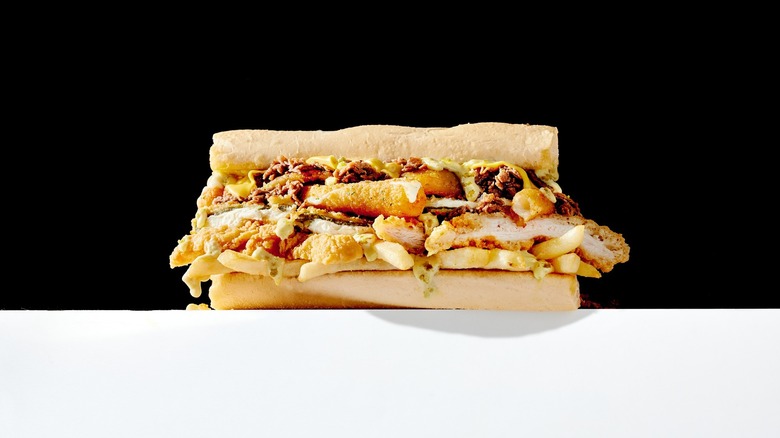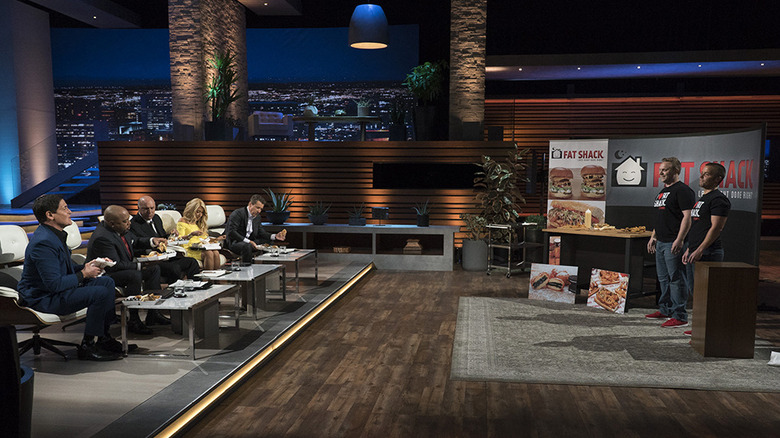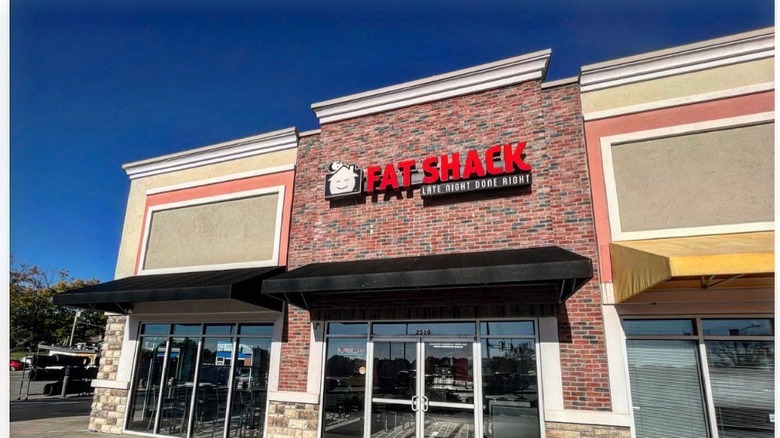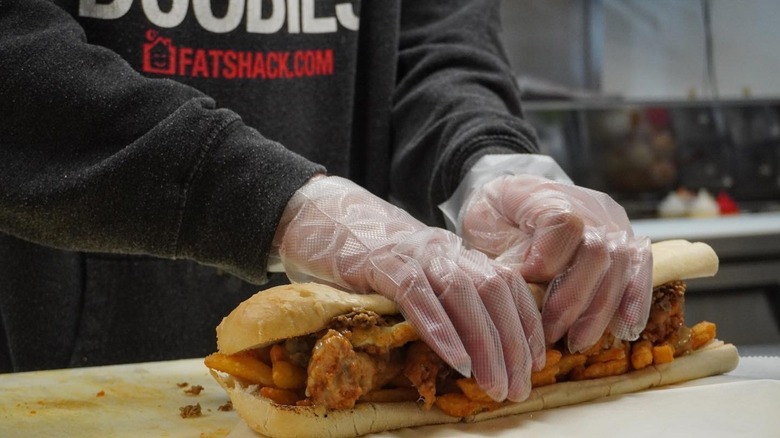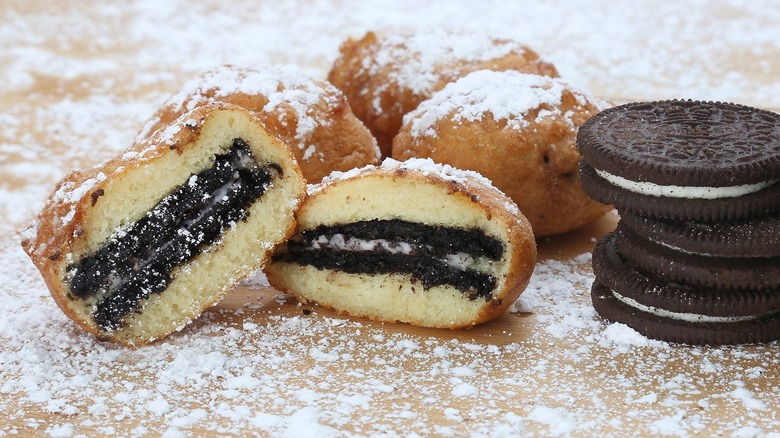Whatever Happened To Fat Shack From Shark Tank?
Fat Shack is a fast-casual restaurant chain known for its unapologetically indulgent creations, including sandwiches loaded with everything from mozzarella sticks and jalapeño poppers to cheesesteak and fries; all wrapped up in one over-the-top bite. What started as a small late-night food operation in New Jersey quickly grew into a franchise that caters to college towns and anyone craving a cheat meal that pulls no punches.
The company was founded in 2010 by Tom Armenti, and the brand got its scrappy start by renting space in a local bagel shop during off-hours. With only $5,000 and a deep understanding of what hungry night owls wanted, Armenti laid the foundation for what would become a national business. Soon after, he relocated to Fort Collins, Colorado, where longtime friend and business partner Kevin Gabauer joined him to help scale the concept. The pair refined the menu, developed a franchise model, and began expanding across multiple states.
Their bold concept and grassroots hustle eventually landed them a spot on Season 10 of "Shark Tank," where they caught the attention of more than one investor. In the end, they struck a deal with Mark Cuban, which gave them the mentorship and funds they needed to take their business to even greater heights.
What happened to Fat Shack on Shark Tank?
Fat Shack founders Tom Armenti and Kevin Gabauer entered the "Shark Tank" in Season 10 seeking $250,000 in exchange for 7.5% equity in their late-night sandwich franchise. They kicked things off by tossing aside a kale salad to introduce their signature "fat sandwiches," each stacked with items like fries, mozzarella sticks, cheesesteak, and jalapeño poppers. This was a wild pitch considering that many people love foods like these, but in a society that tries to at least appear health-conscious publicly, no one would admit craving such decadent eats. The Sharks were both amused and impressed. Several dug into their sample sandwiches with curiosity and surprise — Mark Cuban even called it "nasty good."
Tom and Kevin explained the business' origin, mentioning that at the time of the pitch, Fat Shack had 11 locations (nine of which were franchised) and had made over $22 million in lifetime sales. Of course, when you start throwing out huge numbers, interest will be piqued, and this was no exception in the "Shark Tank." Kevin O'Leary and Daymond John each offered $250,000 for 25%, but Robert Herjavec later countered with $250,000 for 17.5%.
Mark Cuban matched that equity, interested to see what direction the team would go in. After a short discussion, Tom and Kevin negotiated, ultimately asking Mark if he would do the deal at 15%. Mark agreed, and they closed a deal on air for $250,000 in exchange for 15% equity. The pitch stood out for its energy, indulgent food, and the surprise that health-focused Mark Cuban was the one to back a deep-fried sandwich chain.
Fat Shack after Shark Tank
Luckily, Fat Shack wasn't one of the infamous "Shark Tank" food flops. The exposure from "Shark Tank" was incredible and franchise inquiries flooded in (about 3,000), forcing Tom and Kevin to pivot from opportunistic growth to strategic, measured expansion. Instead of taking the first offers, the team instituted a process which included vetting franchisees, piloting sites in core and new markets, and maintaining consistency across locations. By mid‑2025, Fat Shack had grown to 30 stores in 13 states, including notable entries in Texas and Florida; anchoring each with late-night hours and nostalgia‑driven menus.
Social media played a key role in sustaining momentum. Instagram and Facebook became outlets for playful content — late-night challenges, limited-time sandwich specials, and regional memes — keeping fans engaged. Monthly offers like the "$0.15 burger deal" (celebrating its 15th anniversary) and viral "Fat Stacks" (towered sandwiches) brought community interaction along with local PR coverage. Franchisees frequently report sales near $900,000 per year, with multiple aiming for seven‑figure revenue. This validates the founders' emphasis on operational consistency and franchisee support.
Though some markets experienced short‑term dips (attributed largely to pandemic‑era restaurant closures), overall growth has remained steady. The brand has added menu items like wings and deep‑fried Oreos. Behind the scenes, corporate focused on refining supply chains, sharing successful regional promotions, and equipping franchisees with tools to manage lean margins and late-night staffing challenges. In interviews, Tom highlights lean operations and Cuban's counsel as vital to guiding growth. As of June 2025, Fat Shack is well‑positioned for orderly expansion, maintaining strong engagement through local events, student promotions, and franchise onboarding.
Is Fat Shack still in business?
Not only is Fat Shack still in business, the company is doing quite well. It seems like one of those places where you've got to try the burgers yourself and see where they rank. The brand has marked significant growth this spring, with its latest expansion in Melbourne, Florida — the company's second store in the Sunshine State — officially launching in late May. Its Instagram reels emphasize late‑night dining culture, featuring everything from burgers and wings to its signature "Fat Sandwiches" and deep‑fried desserts. A recent post celebrated a "Half Fat Doobie" specialty sandwich at just $4.20 for one day, reinforcing the brand's use of limited‑time deals to engage followers.
Beyond promotional pricing, Fat Shack is leaning into food challenges and viral content. An Instagram reel from three weeks ago highlights a "Randy Santel vs Fat Shack Challenge," showcasing its high‑calorie eating feats and hinting at competitive or influencer collaborations. Fat Shack has teased exclusive items like "Spooky Deep Fried Oreos" and enticed customers with appeals to request new foods, suggesting a menu that evolves through demand.
Facebook pages across cities like Philadelphia, San Marcos, and Orlando remain active. The San Marcos location recently promoted a "Chicken Stack" meal with fries for $5.99, while Orlando teased 50% off wings on Sundays and Mondays.
In summary, Fat Shack is driving growth through targeted franchise expansion (especially in Florida) while leveraging social‑media promotions, viral food challenges, frequent limited‑time offers, and evolving menu items to maintain late‑night buzz and consumer engagement — all documented through its lively Instagram presence and active franchise Facebook pages.
What's next for Fat Shack?
Looking ahead, Fat Shack has set strategic growth targets including expanding from 30 to 100 locations, prioritizing states like South Dakota, Utah, and other college towns identified as untapped, late‑night markets. The franchise pipeline remains robust, with entrepreneurs drawn by success stories and continuous guidance from Cuban's mentorship. Central to this expansion is a focus on consistency, standardized kitchen processes, transparent franchisee training, and lean supply chains which ensure reliable execution.
Menu innovation continues in tandem as limited‑time offers such as "Fat Stacks" and creative milkshake collaborations cater to seasonal cravings and social media virality. Each quarter, new sandwich builds (such as Buffalo Mac & Cheese or Breakfast Sandwich mashups) are tested in select locations before broad rollout. These food innovation strategies reinforce the brand's identity as a playful, over‑the‑top indulgence ally rather than a health-focused chain.
Tom and Kevin emphasize community loyalty by organizing college‑town events, hosting "Eat for a Cause" nights, and pitching into local fundraisers. These grassroots efforts reaffirm the company's origins while driving foot traffic and media coverage. Behind the scenes, corporate investments include refined operations dashboards, improved POS systems, and franchisee support teams to maintain margins and uptime.
Mark Cuban is expected to assist in guidance around regional marketing, real‑estate optimization, and digital ordering integration. Discussions have even begun about testing shared kitchens or food‑hall popups in urban areas to test new geographies. Overall, Fat Shack is executing a smart scaling plan. Slow‑burn growth, incremental menu innovation, and active community engagement let the brand grow bigger while still staying messy.
